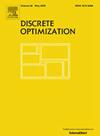相关机器调度的无政府状态代价的改进边界
IF 1.6
4区 数学
Q3 MATHEMATICS, APPLIED
引用次数: 0
摘要
本文引入了相关机器上功利调度对策纳什均衡效率的改进上界。机器有不同的速度,并坚持最短的处理时间优先的政策。每项工作的目标是使其完成时间最小化,而社会目标是使完成时间的总和最小化。我们的主要发现建立了m个机器的一般情况下无政府状态价格的上界为2−1/(4m−2)。对于两台机器的情况,我们将这个界限提高到3/2,对于m台机器的一般情况,当机器的速度可整除时,即,如果每台机器的速度可被任何较慢的机器的速度整除,则该界限提高到2 - 1/(2m)。本文章由计算机程序翻译,如有差异,请以英文原文为准。
An improved bound for the price of anarchy for related machine scheduling
In this paper, we introduce an improved upper bound for the efficiency of Nash equilibria in utilitarian scheduling games on related machines. The machines have varying speeds and adhere to the shortest processing time first policy. The goal of each job is to minimize its completion time, while the social objective is to minimize the sum of completion times. Our main finding establishes an upper bound of on the price of anarchy for the general case of machines. We improve this bound to 3/2 for the case of two machines, and to for the general case of machines when the machines have divisible speeds, i.e., if the speed of each machine is divisible by the speed of any slower machine.
求助全文
通过发布文献求助,成功后即可免费获取论文全文。
去求助
来源期刊

Discrete Optimization
管理科学-应用数学
CiteScore
2.10
自引率
9.10%
发文量
30
审稿时长
>12 weeks
期刊介绍:
Discrete Optimization publishes research papers on the mathematical, computational and applied aspects of all areas of integer programming and combinatorial optimization. In addition to reports on mathematical results pertinent to discrete optimization, the journal welcomes submissions on algorithmic developments, computational experiments, and novel applications (in particular, large-scale and real-time applications). The journal also publishes clearly labelled surveys, reviews, short notes, and open problems. Manuscripts submitted for possible publication to Discrete Optimization should report on original research, should not have been previously published, and should not be under consideration for publication by any other journal.
 求助内容:
求助内容: 应助结果提醒方式:
应助结果提醒方式:


